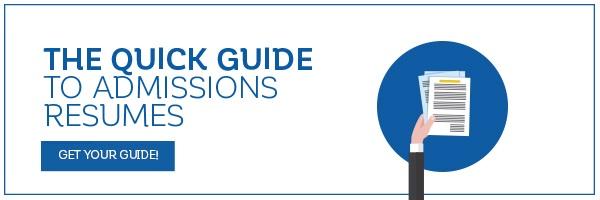|
How Much Should I Draw on My CV/Resume in My SOP? |
||
How Much Should I Draw on My CV/Resume in My SOP?


When submitting an application for college or graduate school, it’s important to view the application holistically. The application includes multiple elements, such as a CV/resume, a personal statement, and grades, among other things. Because this application is key to receiving an admissions offer, it is important to be selective and strategic in choosing which elements of your academic career, personal experience, and professional development to highlight.
Many applicants are tempted to use the CV/resume (and if you’re not sure of the difference, see my article HERE) to simply reiterate or re-list their past experiences or qualifications in essay-form for their personal statement. This “resume in prose” undermines the opportunity the application provides for showcasing multiple sides of oneself. So, how do you decide what to cover in the personal statement when it feels like everything you’ve ever done is already included in your CV?
How to decide what to include in your personal statement
- Step 1: Do a mental check.
Ask yourself, “What aspects of my life (personal experiences; impactful teachers and classes; substantial extracurricular experience) had a significant impact on my life and outlook?”
I emphasize doing this mentally first because it is easy to turn to your CV or resume as a starting point for writing the personal statement; however, to begin with the CV is to risk overlooking other meaningful but non-CV material worth mentioning in a different part of the application, such as your personal statement. I cannot count the number of clients I have had who, only in the course of our conversations, have shared incredibly powerful experiences and self-insight that I would otherwise never have found written on a resume or CV. These very insights often became central to their personal statements.
- Step 2: Identify which achievements and experiences absolutely must be included in your personal statement.
For example, your CV probably (and should!) includes the name of the institution(s) you attended for college (or the name of one’s high school, in the case of college admissions). That institution might be so central to your narrative, or to the story of how you became interested in a particular graduate program or field of study, that it is necessary to include in the personal statement. Other items—the archeological dig you were on in 2015, which was the turning point in your career interests—or the lessons you learned from doing Teach for America last year—might also be great to expand upon in the SOP. Lastly, perhaps counterintuitively, particular weaknesses, such as a short-term job or a weak GPA, should be addressed in the personal statement. Addressing both the strengths and weaknesses of one’s record give YOU the power to frame and contextualize those events and demonstrate your ability to move forward.
- Step 3: Remember that Accepted is here to help!
Our expert consultants work closely with you to personalize the application process and help you to find and express your authentic voice in your writing and/or interview process. While applicants often view their experiences as somehow “the norm,” our consultants are here to remind you that your experiences, academic and otherwise, are unique to you and can all contribute to a personal statement that provides an intriguing and inviting portrait of you to its readers! Contact Accepted today to find out how we can help you earn a spot at your dream school!
 By Rachel Slutsky who has as served as a writing tutor, consultant, and adjunct professor teaching writing. Rachel has assisted applicants in applying to an array of MBA and graduate programs. She earned her masters from the University of Chicago and is currently pursuing her PhD at Harvard University. Want Rachel to help you get Accepted? Click here to get in touch!
By Rachel Slutsky who has as served as a writing tutor, consultant, and adjunct professor teaching writing. Rachel has assisted applicants in applying to an array of MBA and graduate programs. She earned her masters from the University of Chicago and is currently pursuing her PhD at Harvard University. Want Rachel to help you get Accepted? Click here to get in touch!
Related Resources:
- 5 Fatal Flaws to Avoid in Your Grad School Statement of Purpose, a free guide
- What to Include in Your Admissions Resume
- 4 Tips for Highlighting Your Strengths in Your Application Essays
The post How Much Should I Draw on My CV/Resume in My SOP? appeared first on Accepted Admissions Blog.


[0] Comments to this Article